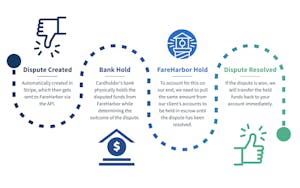- 10 minute read
- Digital Marketing
- Pay-Per-Click
Budgeting Your Marketing Resources: Where to Spend for the Most Impact
Beginner,
Intermediate
Get a behind-the-scenes-look into FareHarbor's 2024 season

Collecting payments is an essential part of doing business. So when credit card disputes happen, you want to act quickly to protect your company.
Not only can disputes be costly, but they’re also stressful and time consuming – they take around 60 to 120 days to resolve.
Fortunately, FareHarbor’s Payments Team has your back. Read on to find out what happens when you get a dispute as well as ways to protect your business from credit card disputes before they happen.
You may think credit card disputes only happen when a customer doesn’t receive a product, but they can occur in industries like travel as well.
1 in 8 disputes filed by cardholders in 2019 were in the travel industry – Chargebacks911.
Also known as chargebacks, credit card disputes happen when a customer contacts their credit card company or bank to report an incorrect charge on their card. During this time, the cardholder’s bank holds the disputed funds while determining the outcome of the dispute.
This could be money in your pocket, so it’s important to work to resolve the issue right away.
A customer may file a dispute for a number of reasons, and this can happen before or after they participate in the tour or activity they booked. When this happens, the bank or credit card company typically asks the customer why they filed the dispute.
Product unacceptable: The customer claims that the service you provided was not as described, or they were dissatisfied with the experience.
Example: It rained and they did not see a whale during their whale watching tour.
Services canceled: The customer claims they were charged even after they canceled their tour or activity.
Example: The customer canceled after the 48-hour cancellation policy on your website and disputed because they demanded a refund.
Unrecognized: The cardholder doesn’t recognize the charge on their credit card statement.
Example: Alexis used David’s credit card to book a wine tasting. He forgot or didn’t know she charged it to his card and disputed the charge.
These are just a few reasons you might receive a dispute. See the full list.

We know receiving a dispute is worrisome, but thankfully it doesn’t happen too often. If you do find yourself in this situation, we’ve got your back every step of the way.
First, FareHarbor will send you an email notifying you of the dispute with a form to fill out so we can start fighting the dispute on your behalf. Pay close attention to the evidence due date as this is an important first step in fighting the dispute.
 Pro tip: Be sure to read the dispute carefully. Many disputes are honest mistakes or misunderstandings and can be resolved with the customer directly, saving you time and money.
Pro tip: Be sure to read the dispute carefully. Many disputes are honest mistakes or misunderstandings and can be resolved with the customer directly, saving you time and money.
The FareHarbor Payments Team puts together an evidence packet to provide proof that the customer should not be refunded. This includes customer details, business information, a copy of your cancellation policy, and anything else you want the bank or credit card company to see. View the full list of what’s included in an evidence packet.
After submission of your evidence packet, you’ll be able to track the status of the dispute using FareHarbor’s Disputes report.
The FareHarbor Payments team will always help you handle a dispute, but we also want to arm you with the information to prevent them in the first place. Fortunately, there are several preventative steps your business can take to protect against disputes.
You must publish a thorough cancellation policy on your website. It’s a good idea to put this on its own page or at the bottom of your tour or activity descriptions.
The policy should include who the customer can contact to make the cancellation, as well as a specific window of time by which they need to cancel, like 48 hours before the activity.
You also need to share the cancellation policy in your confirmation and reminder emails.
 Pro tip: Consider allowing online cancellations to reduce your time on the phone and prevent disputes. By allowing customers to cancel through your Dashboard, they can easily collect a refund or gift card and avoid any issues that might lead to credit card disputes.
Pro tip: Consider allowing online cancellations to reduce your time on the phone and prevent disputes. By allowing customers to cancel through your Dashboard, they can easily collect a refund or gift card and avoid any issues that might lead to credit card disputes.
Being transparent about the experience details will help prevent disputes. Send a confirmation email after the customer books, and also send a reminder email closer to the tour date so that guests don’t miss it. Check out the types of emails you should be sending in our guide to automated emails.
 Pro tip: Update your notification settings so you’ll be notified if an email to a customer fails. That way, you can reach out to the customer for a working email address and they can’t say they never heard from you.
Pro tip: Update your notification settings so you’ll be notified if an email to a customer fails. That way, you can reach out to the customer for a working email address and they can’t say they never heard from you.
To avoid customers disputing because the experience didn’t meet their expectations, make sure you are clear in advertising the tour or activity. Follow our tips and best practices for writing tour and activity descriptions in your Dashboard and on your website.
One of the best ways to stay on top of potential disputes is to keep an eye out for fraudulent payments. They can be hard to spot, so be on the lookout for bookings where the name on the credit card doesn’t match the name of the person who made the booking. If there is other information that doesn’t match (like email or phone number), you may have stumbled on a fraudulent payment.
 Pro tip: Always check the first and last name of the credit card used and make sure it matches the booking name. When checking people in, you should collect cash or refund in full anyone who cannot provide the credit card used online.
Pro tip: Always check the first and last name of the credit card used and make sure it matches the booking name. When checking people in, you should collect cash or refund in full anyone who cannot provide the credit card used online.
If your business takes in-person payments, use FareHarbor-approved card readers to reduce fraud. These readers use chip cards which are inserted into the reader during a transaction. They allow data to be more securely transferred and are much more difficult to counterfeit, helping reduce credit card fraud for you and your customers.
One of the most effective ways to fight a dispute is to prove that the customer did in fact attend the tour or activity. Make these best practices part of your daily routine.
Although no two disputes are the same, these tips should put you on the right track to avoid them before they happen. Learn more about this topic in our Dispute FAQs.